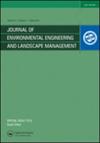污水污泥与园林废弃物生物炭的共循环利用:作为园林植物的生长介质
IF 1.1
4区 环境科学与生态学
Q4 ENVIRONMENTAL SCIENCES
Journal of Environmental Engineering and Landscape Management
Pub Date : 2023-11-07
DOI:10.3846/jeelm.2023.20042
引用次数: 0
摘要
城市绿化产生大量园林废弃物,将园林废弃物热解成生物炭是一种有效的废弃物管理技术。生物炭具有较大的比表面积和土壤修复能力。然而,需要强调的是,关于污水污泥和花园废物生物炭的共同循环利用,以促进美味菌的生长。为此,本研究通过盆栽试验,在50% (w/w)污泥改良的土壤中分别施用0、1.5和3.0% (w/w、CK、FB1.5和FB3)的枯落物生物炭(FB),改善土壤性质,并进一步分析FB对景观植物香叶榕生长和重金属吸收的影响。结果表明:与对照相比,在污泥改良土壤中添加3% FB处理改善了土壤性质,显著提高了松菇干重(86.75%)、根冠比(73.23%)、N(99.44%)、P(116.13%)、K(124.40%)、Pb(78.81%)和Cu(159.01%)积累量。综上所述,FB3处理在促进植物生长和修复土壤方面的效果最好。研究结果表明,城市污水污泥和园林废弃物生物炭可作为酸性土壤修复的改良剂,是城市垃圾处理的可持续发展路径。本文章由计算机程序翻译,如有差异,请以英文原文为准。
CO-RECYCLING OF SEWAGE SLUDGE AND GARDEN WASTE BIOCHAR: AS A GROWING MEDIUM FOR LANDSCAPE PLANT
Urban greening produces a large amount of garden waste, and the pyrolysis of garden waste into biochar is an effective waste management technology. Biochar has a large specific surface area and soil remediation ability. However, the knowledge about the co-recycling of sewage sludge and garden waste biochar to improve the growth of Monstera deliciosa needs to be highlighted. Therefore, we conducted a pot experiment by applying Ficus altissima litter-derived biochar (FB) at rates of 0, 1.5, and 3.0% (w/w, CK, FB1.5, and FB3) in soil amended with sewage sludge at 50% (w/w), to improve the soil properties, and further analyzed the effects of FB on growth and heavy metals (HMs) uptake of landscape plant M. deliciosa. Results showed in comparison with control setups, the addition of 3% FB treatment in sewage sludge amended soil improved the soil properties and significantly increased M. deliciosa dry weight (86.75%), root: shoot ratio (73.23%), N (99.44%), P (116.13%), K (124.40%), Pb (78.81%), and Cu (159.01%) accumulation respectively. In summary, FB3 treatment achieved the best effects in promoting plant growth and soil remediation. These findings revealed that sewage sludge and garden waste biochar could be recycled as amendments for poor acid soils under restoration, a sustainable development path for urban waste disposal.
求助全文
通过发布文献求助,成功后即可免费获取论文全文。
去求助
来源期刊
CiteScore
1.90
自引率
7.70%
发文量
41
审稿时长
>12 weeks
期刊介绍:
The Journal of Environmental Engineering and Landscape Management publishes original research about the environment with emphasis on sustainability.

 求助内容:
求助内容: 应助结果提醒方式:
应助结果提醒方式:


